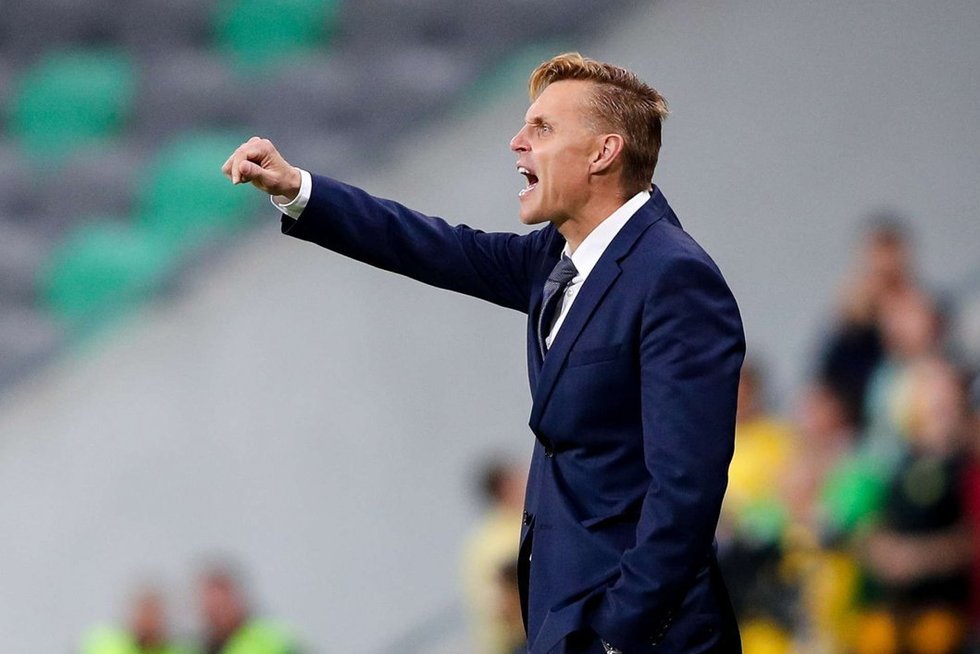

“You have no right to go to the coach and ask ‘why I am not playing?”
A Champions League winner and about as well-travelled a footballer as there is, Edgaras Jankauskas played for 16 clubs in a two-decade career. In that time, he became one of Lithuania’s greatest ever footballers and established a reputation for himself as a consummate professional.
His finest hour came in 2004, when under the stewardship of Jose Mourinho, he won the European Cup with Porto. The triumph was celebrated in his home country and did much to elevate a sport which is not generally top of the pile. That honour goes to basketball.
I tried to play basketball, as kids do in Lithuania. But very soon I realised that my number one sport was football,” Edgaras said of his formative years.
“It doesn’t matter which sport you play, [any sport] can positively affect the other sport. Like now I try to play tennis or gold and I have those skills. Like, to catch the ball with the right timing. And I speak about tennis, the coaches say ‘oh do you play tennis?’ and I said ‘I never played tennis’ and they say ‘oh, you have that approach. Like, you calculate the drop of the ball better than people who play the sport.’” Indeed, Jorge Jesus, the current coach of another one of Edgaras’ former clubs, Benfica, used basketball as an inspiration when organising defensive set pieces.
Though Jankauskas eventually made a name for himself as a lethal centre-forward, he originally played as a midfielder: “I was not bad at that position because I had quite a good view of a field. I have a good long pass and I could give a pass and isolate players if they were moving. So, I could read the game.” It was a skill set he brought with him in his career as a striker.
He was remarkably effective as an off-the-bench player, scoring goal after goal in the latter stages of matches when opposition concentration levels had dropped and legs started to tire. Super subs are impressive, not just because of their ability to make decisive contributions to matches, but also for their patience and strength of character to maintain their levels when they are not appearing regularly in the starting XI.
What was Edgaras’ formula in regard to his success off the bench? “There is no secret. If you are a member of a team, you need to have these qualities, like humility, because you are one of 22 or 24 and you have to be proud of that. Your application has to be the same.”
I probably lack that self-promotion quality,” he continues tellingly. “You have no right to go to the coach and ask ‘why am I not playing?’ I never raised that question in any team I’ve been and I would probably never advise a player I’m coaching to go and ask why he’s not playing.” In this response, Edgaras is the antithesis of the modern baby sitter coach who is a slave to player power. A rare bird indeed.
He has always displayed mental resilience in this manner. It’s an attribute which he has needed to bring with him into his coaching career. “Of course, when you are a player you get a lot of pressure and, as you mention, the crowd, like 30,000 are against you, so it’s tough to carry that. But when you are a coach you are the leading figure of a team and it falls on your head only when the team is not performing. I didn’t know that before, I thought ‘what guilt can a coach have if I am playing bad?'”
I admire Jose a lot because I saw how he managed those emotions. Being under pressure, it was not easy at the time [during the Champions League run in 2003-04] and you can see that even the strong person can crumble a little. I learned a lot from him and I’m very thankful.”
How did Mourinho’s tutelage prepare Edgaras for management? Well, he had an illuminatingly prosaic response: “Nobody will ever be ready to be a coach.”
There are no written rules how to behave otherwise it would be simple. You read, you learn, but you have to go through and live it in the flesh by experience. In the end, you develop qualities that in the beginning you can’t even imagine.”
The longer you are coaching, the more you admire those coaches who are working for 20 or 30 years. You can only imagine what they were going through, the thickness of their skin.”
Get to know more about Soccer HUB!
Follow us on Facebook!
Categories
Latest Courses
-
9 Lessons
-
1 Lesson
-
6 Lessons
You May Also Like
- Blog
- August 1, 2022
- Blog
- June 3, 2022
- Blog
- May 27, 2022
Developed by Brandit Digital Media Services.





